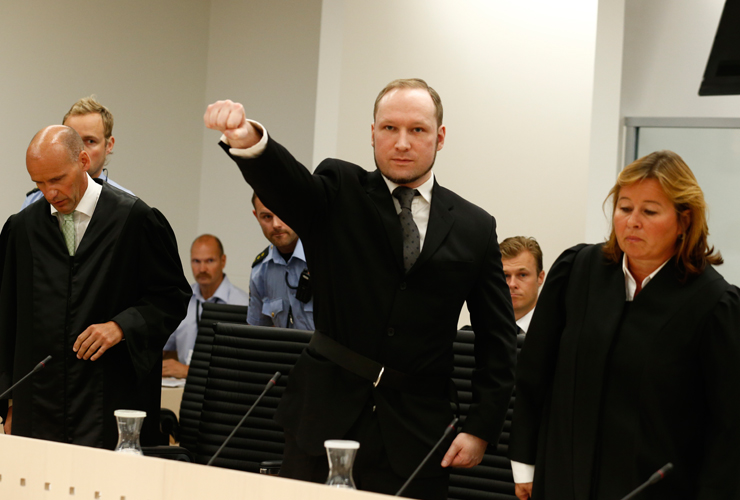Anders Breivik gives Nazi salute on return to court
Jailed Norwegian killer defiant on first day of lawsuit against state's 'inhuman treatment'

A free daily email with the biggest news stories of the day – and the best features from TheWeek.com
You are now subscribed
Your newsletter sign-up was successful
Right-wing extremist Anders Behring Breivik has given a Nazi salute on the first day of his court case against the Norwegian authorities.
Breivik, who killed 77 people in Norway in 2011, claims his human rights have been violated because he has been kept in isolation for almost five years.
His lawyer, Oystein Storrvik, accused the state of "inhuman treatment" in his opening statement, claiming his client's plight was worse than the death penalty.
The Week
Escape your echo chamber. Get the facts behind the news, plus analysis from multiple perspectives.

Sign up for The Week's Free Newsletters
From our morning news briefing to a weekly Good News Newsletter, get the best of The Week delivered directly to your inbox.
From our morning news briefing to a weekly Good News Newsletter, get the best of The Week delivered directly to your inbox.
Before the hearing, Storrvik said Breivik had been "very stressed due to his isolation" in Skien prison, about 60 miles south-west of the capital Oslo.
"One of his main things to do [in prison] was to study and he has stopped that now and I feel that is a sign that isolation has been negative to his psychological health," he said.
Norway's attorney general's office has insisted that conditions are "well within the limits of what is permitted" under the European Convention on Human Rights.
The court hearing, which is being held in the high security compounds of Skien prison's gymnasium, is expected to run until Friday.
A free daily email with the biggest news stories of the day – and the best features from TheWeek.com
Should it decide that prison conditions are so strict they violate Breivik's human rights, it could order an easing of restrictions.
However, doctors are expected to testify that he is not suffering, says The Guardian.
"There are limits to his contacts with the outside world, which are of course strict… but he is not totally excluded from all contact with other people," said state lawyer Marius Emberland. He pointed to Breivik's contact with professionals, albeit from behind a glass partition.
Breivik was given Norway's maximum 21-year sentence in August 2012 for killing eight people in a bomb attack outside a government building in Oslo and then murdering another 69, most of them teenagers, in a rampage at a political camp for young people on the island of Utoya.
During the initial trial Breivik said he would "do it all again because my actions were motivated by goodness not evil" and cited the "necessary war against the Islamisation of Europe" as one of his motives.
-
 Local elections 2026: where are they and who is expected to win?
Local elections 2026: where are they and who is expected to win?The Explainer Labour is braced for heavy losses and U-turn on postponing some council elections hasn’t helped the party’s prospects
-
 6 of the world’s most accessible destinations
6 of the world’s most accessible destinationsThe Week Recommends Experience all of Berlin, Singapore and Sydney
-
 How the FCC’s ‘equal time’ rule works
How the FCC’s ‘equal time’ rule worksIn the Spotlight The law is at the heart of the Colbert-CBS conflict
-
 Epstein files topple law CEO, roil UK government
Epstein files topple law CEO, roil UK governmentSpeed Read Peter Mandelson, Britain’s former ambassador to the US, is caught up in the scandal
-
 Iran and US prepare to meet after skirmishes
Iran and US prepare to meet after skirmishesSpeed Read The incident comes amid heightened tensions in the Middle East
-
 Israel retrieves final hostage’s body from Gaza
Israel retrieves final hostage’s body from GazaSpeed Read The 24-year-old police officer was killed during the initial Hamas attack
-
 China’s Xi targets top general in growing purge
China’s Xi targets top general in growing purgeSpeed Read Zhang Youxia is being investigated over ‘grave violations’ of the law
-
 Panama and Canada are negotiating over a crucial copper mine
Panama and Canada are negotiating over a crucial copper mineIn the Spotlight Panama is set to make a final decision on the mine this summer
-
 Why Greenland’s natural resources are nearly impossible to mine
Why Greenland’s natural resources are nearly impossible to mineThe Explainer The country’s natural landscape makes the task extremely difficult
-
 Iran cuts internet as protests escalate
Iran cuts internet as protests escalateSpeed Reada Government buildings across the country have been set on fire
-
 US nabs ‘shadow’ tanker claimed by Russia
US nabs ‘shadow’ tanker claimed by RussiaSpeed Read The ship was one of two vessels seized by the US military